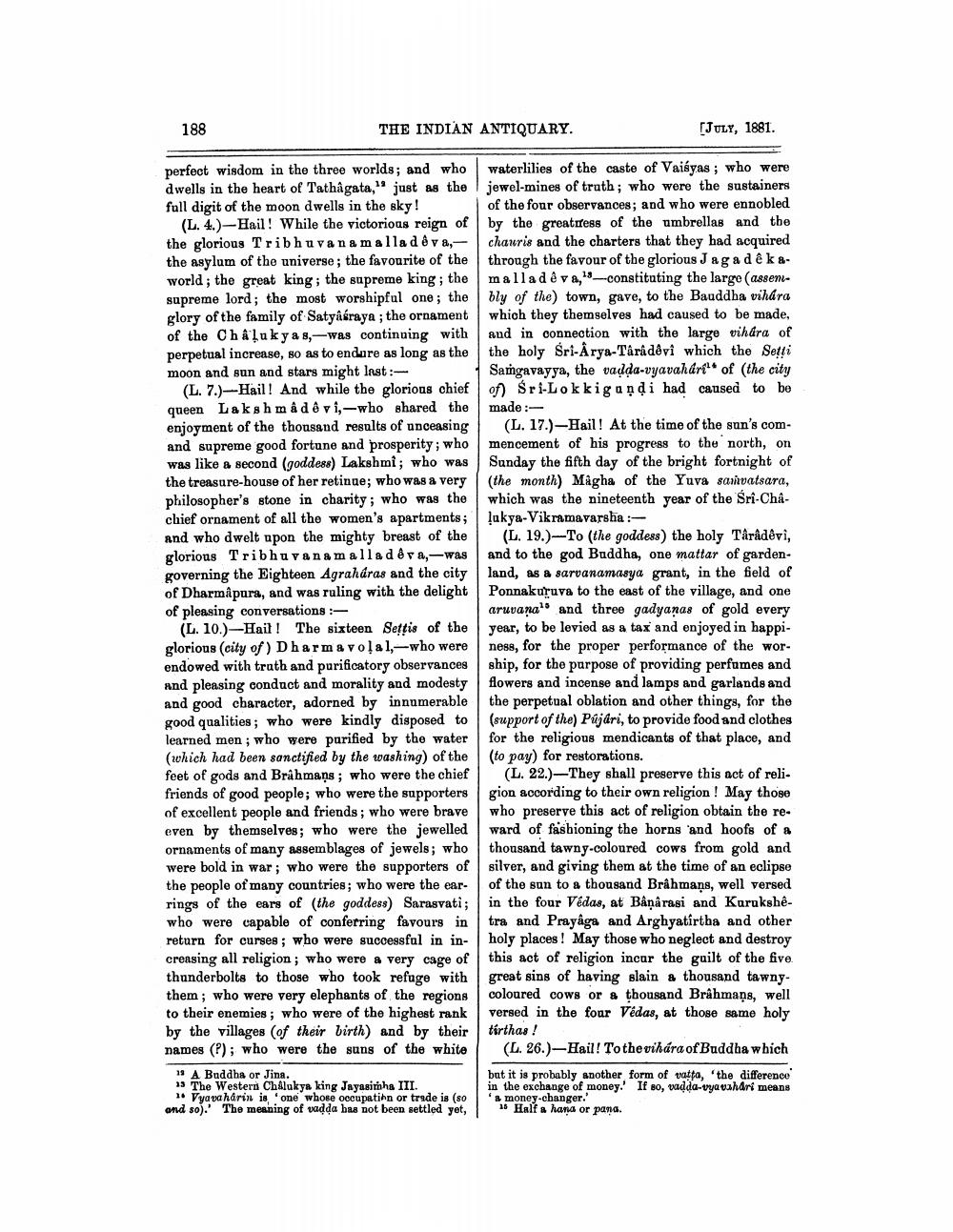________________
188
THE INDIAN ANTIQUARY.
perfect wisdom in the three worlds; and who dwells in the heart of Tathagata," just as the full digit of the moon dwells in the sky!
(L. 4.)-Hail! While the victorious reign of the glorious Tribhuvanamalla dêva, the asylum of the universe; the favourite of the world; the great king; the supreme king; the supreme lord; the most worshipful one; the glory of the family of Satyâéraya; the ornament of the Chalukyas,-was continuing with perpetual increase, so as to endure as long as the moon and sun and stars might last:
(L. 7.)-Hail! And while the glorious chief queen Lakshmâ dêvi,-who shared the enjoyment of the thousand results of unceasing and supreme good fortune and prosperity; who was like a second (goddess) Lakshmi; who was the treasure-house of her retinue; who was a very philosopher's stone in charity; who was the chief ornament of all the women's apartments; and who dwelt upon the mighty breast of the glorious Tribhuvanamalladeva,-was governing the Eighteen Agraharas and the city of Dharmapura, and was ruling with the delight of pleasing conversations :
(L. 10.)-Hail! The sixteen Settis of the glorious (city of) Dharmavolal,-who were endowed with truth and purificatory observances and pleasing conduct and morality and modesty and good character, adorned by innumerable good qualities; who were kindly disposed to learned men; who were purified by the water. (which had been sanctified by the washing) of the feet of gods and Brahmans; who were the chief friends of good people; who were the supporters of excellent people and friends; who were brave even by themselves; who were the jewelled ornaments of many assemblages of jewels; who were bold in war; who were the supporters of the people of many countries; who were the earrings of the ears of (the goddess) Sarasvati; who were capable of conferring favours in return for curses; who were successful in increasing all religion; who were a very cage of thunderbolts to those who took refuge with them; who were very elephants of the regions to their enemies; who were of the highest rank by the villages (of their birth) and by their names (?); who were the suns of the white
13 A Buddha or Jina.
13 The Western Chalukya king Jayasimha III.
1 Vyavahárin is one whose occupation or trade is (so and so). The meaning of vadda has not been settled yet,
[JULY, 1881.
waterlilies of the caste of Vaisyas; who were jewel-mines of truth; who were the sustainers of the four observances; and who were ennobled by the greatness of the umbrellas and the chauris and the charters that they had acquired through the favour of the glorious J ag a dê kamalla dêva, constituting the large (assembly of the) town, gave, to the Bauddha vihára which they themselves had caused to be made, and in connection with the large vihara of the holy Sri-Arya-Târâdêvî which the Setti Samgavayya, the radda-syanaldri of (the city of) Sri-Lokkigundi had caused to be
made:
(L. 17.)-Hail! At the time of the sun's commencement of his progress to the north, on Sunday the fifth day of the bright fortnight of (the month) Magha of the Yuva samvatsara, which was the nineteenth year of the Śrî-Châlukya-Vikramavarsha:
(L. 19.) To (the goddess) the holy Târâdêvì, and to the god Buddha, one mattar of gardenland, as a sarvanamasya grant, in the field of Ponnakuruva to the east of the village, and one aruvana and three gadyanas of gold every year, to be levied as a tax and enjoyed in happiness, for the proper performance of the worship, for the purpose of providing perfumes and flowers and incense and lamps and garlands and the perpetual oblation and other things, for the (support of the) Pujari, to provide food and clothes for the religious mendicants of that place, and (to pay) for restorations.
(L. 22.) They shall preserve this act of religion according to their own religion! May those who preserve this act of religion obtain the reward of fashioning the horns and hoofs of a thousand tawny-coloured cows from gold and silver, and giving them at the time of an eclipse of the sun to a thousand Brahmans, well versed in the four Védas, at Bânârasi and Kurukshêtra and Prayaga and Arghyatirtha and other holy places! May those who neglect and destroy this act of religion incur the guilt of the five. great sins of having slain a thousand tawnycoloured cows or a thousand Brahmans, well versed in the four Védas, at those same holy tirthas!
(L. 26.)-Hail! To the vihara of Buddha which
but it is probably another form of vatta, 'the difference in the exchange of money. If so, vadda-vyavahari means a money-changer.'
1 Half a hana or pana.




